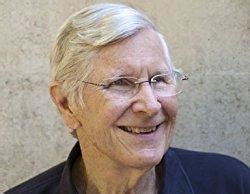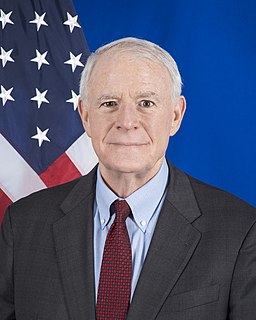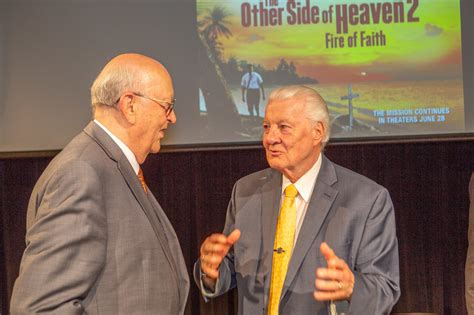A Quote by Augustus Napier
The ubiquitous and acutely conscious presence of our adolescents is a major problem, especially since much of their consciousnessseems to be focused on sexuality--ours and theirs. They expect us to ignore them if they are kissing their dates in the family room; but let us so much as wink at one another, and they whistle loudly.
Related Quotes
There is a deep sense in which we are all ghost towns. We are all haunted by the memory of those we love, those with whom we feel we have unfinished business. While they may no longer be with us, a faint aroma of their presence remains, a presence that haunts us until we make our peace with them and let them go. The problem, however, is that we tend to spend a great deal of energy in attempting to avoid the truth. We construct an image of ourselves that seeks to shield us from a confrontation with our ghosts. Hence we often encounter them only late at night, in the corridors of our dreams.
Do any of us, except in our dreams, truly expect to be reunited with our hearts' deepest loves, even when they leave us only for minutes, and on the most mundane of errands? No, not at all. Each time they go from our sight we in our secret hearts count them as dead. Having been given so much, we reason, how could we expect not to be brought as low as Lucifer for the staggering presumption of our love?
Much as we wish, not one of us can bring back yesterday or shape tomorrow. Only today is ours, and it will not be ours for long, and once it is gone it will never in all time be ours again. Thou only knowest what it holds in store for us, yet even we know something of what it will hold. The chance to speak the truth, to show mercy, to ease another’s burden. The chance to resist evil, to remember all the good times and good people of our past, to be brave, to be strong, to be glad.
When we ignore the prostituted child, we actually lend our hand to their abuse. When we ignore the widow and the orphan in their distress, we actually add to their pain. When we ignore the slave who remains captive, it's us who is entrapping them. When we forget the refugee, it's actually us who is displacing them. When we choose not to help the poor and the needy, we actually rob them. Perhaps the only fair thing to say is that when we forsake the lives of others, we actually forsake our own.
As we live our human lives, let us be like the water. Let us be conscious of the flow. Let us not forget the great ground of being that draws us on through life. Let us live in a knowing hope, aware that all being is in transition, that all movement is back to the source. Let us treat those around us as reminders of our illusionary individuality. We know that they are us and we are them connected in ways we cannot fathom. Let us grow in compassion for all beings, for they share our journey.
Our senses perceive no extreme. Too much sound deafens us; too much light dazzles us; too great distance or proximity hinders ourview. Too great length and too great brevity of discourse tends to obscurity; too much truth is paralyzing.... In short, extremes are for us as though they were not, and we are not within their notice. They escape us, or we them.
It is an odd fact that what we now know of the mental and emotional life of infants surpasses what we comprehend about adolescents. . . . That they do not confide in us is hardly surprising. They use wise discretion in disguising themselves with the caricatures we design for them. And unfortunately for us, as for them, too often adolescents retain the caricatured personalities they had merely meant to try on for size.
Adolescents' immature thinking makes it difficult for them to process the divorce. They tend to see things in black-and-white terms and have trouble putting events into perspective. They are absolute in their judgments and expect perfection in parents. They are likely to be self-conscious about their parent's failures and critical of their every move. They have the expectations that parents will keep them safe and happy and are shocked by the broken covenant. Adolescents are unforgiving.
All of us, single or married, are eternally part of some family-someway, somewhere, somehow-and much of our joy in life comes as we correctly recognize and properly develop those family relationships. We come to this earth charged with a mission: to learn to love and serve one another. To best help us accomplish this, God has placed us in families, for he knows that is where we can best learn to overcome selfishness and pride and to sacrifice for others and to make happiness and helpfulness and humility and love the very essence of our character.
What I’m trying to show is that the main event today is not seen by those of us that are living it… So it’s not the effect of [technology], it is that everything exists with-in [its milieu]. It's not that we use technology, we live technology. Technology has become as ubiquitous as the air we breathe, so we are no longer conscious of its presence.
Nothing can tend so much to humble us before the mercy and justice of God as the consideration of His benefits and our own sins. Let us, then, consider what He has done for us, and what we have done against Him; let us call to mind our sins in detail, and His gracious benefits in like manner, remembering that whatever there is of good in us is not ours, but His, and then we need not be afraid of vainglory or of taking complacency in ourselves.
































